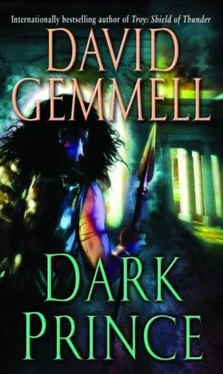she said. 'Go now — and swiftly. I know that you will return one day. I know of your secret, Parmenion. I know the reason why you must travel with Alexander. But your destiny is here and one day you will come back. And I shall be waiting here, just as you see me. I shall be here.'
'I cannot promise that,' he said, 'though I desire it with all my heart.'
'You do not have to. Last night I had a dream. A grey-bearded sorcerer appeared to me and told me to be here tonight. He said you would leave, returning to your own world. But he also said that he would do his best to send you back to me. I will wait.'
Parmenion said nothing. Backing away several steps, he spun on his heel and strode up the hill.
Aristotle was waiting, and as the Spartan came alongside him the magus lifted his arm.
The Gateway shimmered once more. .
The City of Mieza, 337 BC
The man called Aristotle sat alone in the deserted gardens of the school building, gazing towards the north, watching the storm-clouds loom above the rearing Bora Mountains. A cold breeze blew and he shivered, drawing his grey woollen cloak more tightly about his frame.
Glancing back towards the house he saw his wife, Pythias, gathering herbs in the small cultivated patch of earth by the kitchen. It would soon be time to leave, putting behind him the last fourteen years — saying farewell to Mieza, to Macedonia, to Greece.
He sighed. Immortality was a burden and yet, like the narcotics of Egypt, wholly addictive. To be relieved of the prospect of death only heightened the fear of dying. The longer he lived the more bored he became, the more he longed for the peace of the grave, the more terrified he became at the thought of it.
And the memories. .
So many. . Three thousand years ago he had almost gone mad with them. But Pendarric had saved him, teaching him to use the Stones more wisely. Each life of his past had been reduced to a single key word, locked in his mind.
The Makedones years had become Iskander. Merely by summoning the word to conscious thought he could see again the Golden Child and the shining Gateway, and all the years that preceded it. But now he was reaching the point where even the keys shone in his mind like stars, thousands upon thousands.
What is there that is new, he wondered?
The answer came swift as a stab in the heart.
There is nothing that is new under the sun. All is vanity.
He smiled and unlocked the key to the life he had shared with the Philosopher. Golden days. A time when there were still discoveries to be made, surprises to be enjoyed.
Why are you so melancholy, he asked himself? Around the bench where he sat were a dozen seats, empty now, but not long ago they were occupied by the sons of Macedonian nobles — young men full of hope, nurturing dreams. And
— always at their centre, a bright shining sun in their lives — there was Alexander.
Now you have it, he realized.
Alexander.
Aristotle rose and wandered to the northern gate, pushing it open and walking out into the foothills of Mount Bermion. Throughout the ages he had seen men, great men, men of wisdom, men of war, secure in their arrogance, dismissive of the past. Yet the past held all the answers to life's mysteries and each successive generation unknowingly locked them away. Then searched for them in the unborn futures.
I had high hopes for you, Alexander, he thought. You have a fine mind, perhaps the most brilliant since the Philosopher ruled in Jerusalem. Certainly you rival Pendarric in the days when he reigned over Atlantis.
Yet what is it that calls you? Wisdom? The pursuit of knowledge? No. You hear the trumpets of war, you seek the Whore of Conquest. Even with the Chaos Spirit locked outside you, still you are a man, and men will always lust for glory.
And the others will follow you. He pictured them, their young faces bright with longing for a future they knew to be rich with promise: Ptolemy, Nearchos, Philotas, Nicci, Derdas and the others. Like all young men, they revelled in their strength and were scornful of the deeds of their fathers.
Aristotle stopped by a trickling stream, sitting with his back to a boulder out of the wind. A hawk swooped out of the sky, dropping like a stone, his talons ripping into a young rabbit just emerging from its burrow into the dusk. The captured beast did not struggle as the bird swept back into the air, it hung limply in the hawk's grip. Aristotle's spirit reached out to touch the creature. It was dead.
'A curse on all hawks,' he said aloud.
'He has mouths to feed,' said a voice. Aristotle looked up and smiled at the tall figure moving through the shadows of the trees to sit beside him. The man settled himself, wincing as his arthritic knee refused to bend.
'I thought I'd find you here,' said Parmenion, removing his helm and running his hand through his sweat-soaked iron-grey hair. 'Philip wants you to come to Pella for the wedding.'
Aristotle shook his head. 'I shall not be there, Parmenion.'
'Philip will not be best pleased '
'His anger is immaterial to me. I shall be walking the Dragon Paths to other worlds.'
'And Pythias?'
'I will leave her money. She will not mourn my passing; she kept my bed warm, but there is little love between us.'
He looked deeply into Parmenion's face, seeing the sharply chiselled lines, the dark smudges below the bright blue eyes. 'You look tired, my friend.'
Parmenion shrugged. 'I am sixty-three years old. I expect to be tired after a long campaign.'
'Surely you can rest now? Since Philip crushed the Athenians and Thebans at Chaironeia he has become, in all but name, the Lord of Greece. Where now are his enemies?'
'Everywhere,' replied Parmenion, with a wry smile.
'I accept that,' said Aristotle, returning the smile, 'but I meant where are the enemies that can cause him harm? There are no armies left for him to conquer. He rules from Thrace to Epirus, from Paionia to Thessaly. Everyone pays him homage — even Athens. I hear they erected a statue to him after Chaironeia. Unbelievable!'
'Not really. The Athenians expected us to march on their city and ransack it. Instead Philip returned their dead with full military honours and sued for peace. Their relief was immense.'
'Why did he spare them? Athens has been a thorn in his side for years.'
Parmenion shrugged. 'Philip has always remembered the deeds of his twin in Makedon. He was determined never to repeat such evils. But also he has a greater dream: he looks to extend his realm to the east.'
'Where else can he go? He cannot take on the might of Persia.'
'He has no choice. Macedonia now has a huge army — cavalry, siege-engineers, mercenaries. All need feeding, payment. Where else can he go? The Great King rules over a hundred nations, all rich.'
'And that is your answer,' said the magus . 'One hundred nations, all with armies. The Great King could put a million men in the field against you.'
'I know,' said Parmenion wearily.
Aristotle pushed himself to his feet, extending his hand to haul Parmenion upright. The Spartan's knee cracked painfully and he stretched his leg. 'I am better from the back of a horse these days,' he said.
'Come, let us go home. You and I shall have a farewell drink.'
Long into the night the two men sat talking in the small andron at the rear of the schoolhouse. A brazier of coals burned at the centre of the room, and several lanterns flickered on the walls. The room was warm, the night wind rattling the shutters on the single window.
'Are you content?' asked Aristotle suddenly. Parmenion smiled, but did not answer. 'Do you wish you had remained in Achaea?'
'Of course. But it is foolish to dwell on past mistakes.'
Читать дальше












